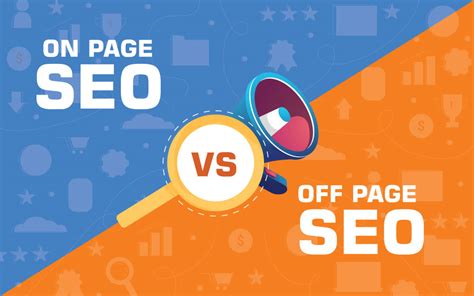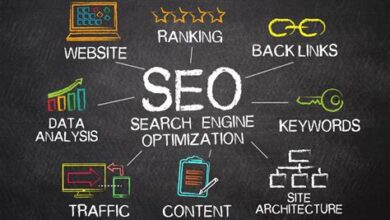On-Page vs. Off-Page SEO: Key Differences and Strategies

Unlock the power of search engine optimization by understanding the crucial distinction between on-page vs. off-page SEO. This blog post explores the fundamental differences and strategies involved in each. On-page SEO focuses on optimizing elements within your website, such as content, keywords, and technical aspects, to improve search engine rankings. Off-page SEO, conversely, involves external factors like backlinks and social signals that influence your website’s authority and reputation. We delve into specific techniques for both, highlighting key factors and actionable strategies to combine on-page and off-page efforts for optimal SEO performance and visibility.
Understanding SEO: On-Page vs. Off-Page Optimization Basics
Search Engine Optimization (SEO) is crucial for enhancing a website’s visibility and attracting organic traffic. It encompasses various techniques designed to improve a site’s ranking in search engine results pages (SERPs). The world of SEO is broadly categorized into two main areas: on-page optimization and off-page optimization. Understanding the differences between these two is essential for any digital marketer or website owner looking to boost their online presence. On-page SEO refers to the optimization of elements within your website, while off-page SEO involves actions taken outside of your website to improve your rankings.
| Factor | On-Page SEO | Off-Page SEO |
|---|---|---|
| Definition | Optimizing elements within your website | Actions taken outside your website to improve rankings |
| Examples | Keyword research, content optimization, title tag optimization | Link building, social media marketing, brand mentions |
| Control | Direct control | Indirect control |
| Focus | Relevance and user experience | Authority and reputation |
On-page SEO focuses on ensuring that your website is search engine friendly and provides a great user experience. This involves optimizing various elements such as title tags, meta descriptions, header tags, content, internal linking, and image optimization. The goal is to make it easier for search engines to understand what your website is about and to ensure that visitors find your site valuable and easy to navigate. Effective on-page SEO can significantly improve your website’s relevance and ranking for specific keywords.
Off-page SEO, on the other hand, involves strategies implemented outside of your website to build your site’s authority and reputation. This primarily includes link building, where you acquire backlinks from other reputable websites. Other off-page SEO activities include social media marketing, brand mentions, and influencer outreach. The more high-quality backlinks your website has, the more trustworthy and authoritative it appears to search engines, which can lead to higher rankings.
Both on-page and off-page SEO are integral parts of a comprehensive SEO strategy. While on-page SEO ensures that your website is optimized for search engines and users, off-page SEO helps build your website’s credibility and authority in the online world. Neglecting either aspect can hinder your website’s ability to rank well in search results. A balanced approach, combining both on-page and off-page techniques, is the most effective way to achieve sustainable SEO success. Remember, consistent effort and adaptation to algorithm updates are key to maintaining and improving your search engine rankings.
- Key SEO Concepts:
- Keyword Research: Identifying relevant and high-traffic keywords.
- Content Optimization: Creating high-quality, engaging, and relevant content.
- Link Building: Acquiring backlinks from authoritative websites.
- Technical SEO: Ensuring your website is crawlable and indexable by search engines.
- User Experience (UX): Designing a website that is user-friendly and provides value.
- Mobile Optimization: Ensuring your website is responsive and works well on mobile devices.
In summary, understanding the fundamental differences between on-page and off-page SEO is the first step towards creating a successful SEO strategy. By focusing on both aspects, you can improve your website’s visibility, attract more organic traffic, and ultimately achieve your business goals.
Deep Dive Into On-Page vs. Off-Page SEO Techniques
Delving deeper into the world of SEO, it’s crucial to understand the nuances of both on-page vs. off-page techniques. On-page SEO involves optimizing elements within your website to improve search engine rankings and user experience. This includes everything from keyword placement and content quality to technical aspects like site speed and mobile-friendliness. Mastering on-page SEO ensures your website is easily understandable and valuable to both search engines and visitors.
Off-page SEO, on the other hand, focuses on activities outside of your website to raise the authority of your domain. This primarily involves building backlinks from other reputable websites, social media marketing, and other promotional activities that enhance your brand’s visibility and credibility. A strong off-page SEO strategy signals to search engines that your website is a trusted and authoritative source of information.
| Feature | On-Page SEO | Off-Page SEO |
|---|---|---|
| Focus | Website Optimization | External Promotion |
| Control | Direct Control | Indirect Control |
| Key Factors | Content, Keywords, Technical Aspects | Backlinks, Social Signals, Brand Mentions |
| Goal | Improve Relevance and User Experience | Increase Authority and Visibility |
While distinct, both on-page and off-page SEO are interconnected and essential for a comprehensive SEO strategy. Neglecting either aspect can limit your website’s potential to rank high in search engine results pages (SERPs). By carefully balancing these two pillars of SEO, you can build a robust online presence that attracts organic traffic and drives conversions. A successful SEO strategy requires a holistic approach, integrating both on-page and off-page tactics.
Keyword Research and Targeting
Effective keyword research is the bedrock of any successful on-page SEO strategy. It involves identifying the terms and phrases your target audience uses when searching for information related to your business. These keywords should then be strategically incorporated into your website’s content, meta descriptions, and title tags to improve relevance for specific search queries. Using keyword research tools helps in understanding search volume and competition, allowing for informed decisions on which keywords to target.
Content Quality and Relevance
High-quality, relevant content is king in the world of SEO. Search engines prioritize websites that provide valuable and engaging content to their users. This means creating content that is not only well-written and informative but also tailored to meet the needs and interests of your target audience. Regularly updating your website with fresh, relevant content signals to search engines that your site is active and provides value to users.
- On-Page SEO Elements:
- Title Tags Optimization
- Meta Description Optimization
- Header Tags (H1-H6) Usage
- Image Optimization (Alt Text)
- Internal Linking
- URL Structure
Technical SEO Considerations
Technical SEO focuses on optimizing the technical aspects of your website to improve its crawlability and indexability by search engines. This includes factors like site speed, mobile-friendliness, site architecture, and the implementation of schema markup. A well-optimized website from a technical standpoint ensures that search engines can easily access and understand your content, leading to better rankings.
Key Differences: On-Page vs. Off-Page SEO Factors
Understanding the distinction between on-page vs. off-page SEO is crucial for developing a comprehensive SEO strategy. On-page SEO refers to all the techniques you can implement directly within your website to improve its search engine rankings. This includes optimizing content, meta descriptions, and internal linking structures. The goal is to make your website easily understandable for both users and search engine crawlers.
| Factor | On-Page SEO | Off-Page SEO |
|---|---|---|
| Definition | Optimizing elements within your website. | Optimizing elements outside your website. |
| Control | Full control. | Limited control. |
| Focus | Relevance, user experience, and technical SEO. | Authority, reputation, and trust. |
| Examples | Keyword optimization, content quality, site speed. | Backlinks, social media marketing, brand mentions. |
Conversely, off-page SEO encompasses all the activities you undertake outside of your website to raise its ranking. This primarily involves building backlinks from reputable websites, engaging in social media marketing, and enhancing your brand reputation. While you have less direct control over these factors, they play a significant role in establishing your website’s authority and credibility in the eyes of search engines.
- Control: On-page SEO gives you direct control, while off-page SEO involves influencing external factors.
- Focus: On-page SEO targets relevance and user experience; off-page SEO focuses on authority and trust.
- Tactics: On-page SEO includes keyword optimization and site speed; off-page SEO involves backlinks and social media.
- Measurement: On-page SEO is measured through metrics like bounce rate; off-page SEO is gauged by domain authority.
- Impact: On-page SEO immediately affects rankings, while off-page SEO has a longer-term impact.
The key difference lies in the sphere of influence. On-page SEO is about making your website the best it can be, ensuring it is technically sound, provides excellent user experience, and offers valuable content. Off-page SEO, on the other hand, is about building your website’s reputation and authority across the web, signaling to search engines that your site is a trusted source of information.
Ultimately, both on-page vs. off-page SEO are vital components of a successful search engine optimization strategy. While on-page SEO provides the foundation for a well-optimized website, off-page SEO amplifies its reach and credibility. By understanding and effectively implementing both, you can significantly improve your website’s visibility and attract more organic traffic.
Actionable Strategies: Combining On-Page vs. Off-Page SEO
To truly excel in search engine rankings, it’s crucial to understand that on-page and off-page SEO are not mutually exclusive; they are complementary components of a successful SEO strategy. A robust on-page foundation makes your website appealing and easy for search engines to crawl, while effective off-page SEO builds your site’s authority and trustworthiness in the eyes of both search engines and users. This section provides actionable strategies for integrating these two critical areas to maximize your SEO impact.
One powerful approach is to ensure your content is not only optimized for relevant keywords but also designed to be highly shareable and link-worthy. This means creating high-quality, informative, and engaging content that naturally attracts backlinks from other reputable websites. When crafting your content, consider what topics are currently trending in your industry and how you can offer a unique perspective or valuable insights. Optimizing images with descriptive alt text and using internal links to connect related content on your site are additional on-page tactics that support off-page efforts by improving user experience and site navigation, encouraging longer visits and potentially more shares.
| Strategy | On-Page SEO Element | Off-Page SEO Element |
|---|---|---|
| Content Creation | Keyword optimization, readability | Promote content on social media, guest blogging |
| Link Building | Internal linking, anchor text optimization | Earning backlinks from authoritative sites |
| Social Media | Sharing content on relevant platforms | Engaging with followers, building brand awareness |
| Brand Building | Optimizing brand mentions on website | Encouraging positive reviews and testimonials |
Furthermore, consider using social media platforms to amplify your content and engage with your target audience. While social signals are not a direct ranking factor, they can indirectly influence your SEO by increasing brand visibility and driving traffic to your website, which can lead to more backlinks and improved search engine rankings. Participating in industry forums and communities, and engaging with influencers in your niche can also significantly enhance your off-page SEO efforts by building relationships and establishing yourself as an authority in your field. Remember that consistent and ethical strategies are key to achieving long-term success in both on-page and off-page SEO.
Steps to Integrate SEO Strategies:
- Keyword Research Alignment: Ensure that your on-page keyword targeting informs your off-page link building and content promotion strategies.
- Content Promotion: Actively promote your optimized content through social media, email marketing, and outreach to relevant websites and influencers.
- Guest Blogging: Contribute high-quality articles to reputable websites in your industry, including backlinks to your site.
- Social Engagement: Engage with your audience on social media platforms, fostering a community and driving traffic back to your website.
- Monitor and Analyze: Regularly monitor your website’s performance using tools like Google Analytics and Search Console, and adjust your strategies accordingly.
Finally, it’s important to continuously monitor and analyze the results of your combined on-page and off-page SEO efforts. By tracking key metrics such as organic traffic, keyword rankings, and backlink profiles, you can gain valuable insights into what’s working and what’s not, allowing you to refine your strategies and maximize your SEO ROI. Remember to stay up-to-date with the latest search engine algorithm updates and industry best practices to ensure your website remains competitive in the ever-evolving online landscape. A holistic approach that considers both on-page and off-page SEO is essential for achieving sustainable success in search engine optimization.



